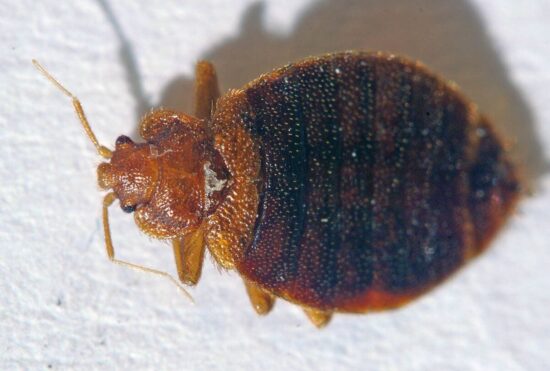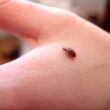Nobody wants to wake up covered in itchy red bumps from bed bugs. But if you’re dealing with these pesky bites, you might be wondering: do bed bug bites spread when scratched? The short answer is no, but there’s more to the story. While scratching won’t make the bites multiply or move to other parts of your body, it can create some serious problems that are just as concerning.
Let’s clear up the confusion and look at what really happens when you scratch bed bug bites, plus what you can do to feel better faster.
The Science Behind Bed Bug Bites and Scratching
Many people worry that bed bug bites spread when scratched, but this is actually a common myth. Understanding what really happens can help you make better choices about treating your bites.
What Actually Happens When You Scratch
Bed bug bites don’t multiply if you itch them. The bites themselves stay exactly where they are and don’t move to other areas of your skin. Bed bugs also don’t carry or spread disease, so the bite is not contagious.
- Kill bed bugs and bed bug eggs
- Use spray as a spot treatment around bed frames, mattress seams/tufts/folds, and baseboards
- Kills even the toughest bed bugs
- The continuous spray Comfort Wand easily gets into hard-to-reach areas
So why do some people think bed bug bites spread when scratched? It could appear as if they were spreading because as you scratch them they DO tend to become a deeper red color and will leave a very puffy, round welt. When you scratch, the bite becomes more inflamed and swollen, making it look bigger and more obvious. This can trick you into thinking the bite is spreading or getting worse.
Another reason people might think their bites are spreading is because bed bugs often bite multiple times in one night. New bites can show up over several days, especially since it can take up to 14 days after the initial bite for a bite mark to appear. These new bites aren’t caused by scratching the old ones but rather from continued bed bug activity.
Why Bed Bugs Don’t Spread Disease
Unlike mosquitoes or ticks, bed bugs are not known to spread diseases to people. All studies conducted to date indicate that there is no evidence to suggest that bed bugs transmit disease to humans or from humans to humans. This means that even if you scratch a bite until it bleeds, you won’t spread any bed bug related illness to other parts of your body.
The Real Dangers of Scratching Bed Bug Bites
While bed bug bites spread when scratched isn’t a real concern, scratching does create other serious problems that you should know about.
Secondary Bacterial Infections Are the Main Risk
The biggest danger from scratching bed bug bites isn’t that the bites will spread, but that you might get a bacterial infection. Bug bites create teeny holes in your skin that can allow bacteria to fall in. If you scratch the bite, that opens up your skin more, creating even bigger opportunities for germs to get in and set up shop.
Scratching can cause superinfection, leading to impetigo, cellulitis, or folliculitis. These infections happen when bacteria like Streptococcus (strep) or Staphylococcus aureus (staph) can enter your skin after a bug bite.
Types of Infections You Might Get
Here are the main types of infections that can happen when you scratch bed bug bites too much:
Impetigo is probably the most common infection from scratching. A local bacterial infection. Gives sores, soft scabs and pus. Caused by scratching or picking at the bites. This infection usually stays in one area but can be painful and take a while to heal.
Cellulitis is more serious. Cellulitis is a bacterial infection that requires medical attention and, likely, a round of antibiotics. This infection can spread through your skin and make you feel sick all over.
Folliculitis happens when the hair follicles around the bite get infected from scratching. This can cause small, pus filled bumps that look similar to acne.
Scarring and Slow Healing
Even though bed bug bites spread when scratched is a myth, scratching can still cause lasting damage. If you scratch the bites too much, you can break the skin and increase your risk of getting permanent scars. The more you scratch, the longer the bites take to heal, and the more likely you are to end up with marks that stick around long after the bed bugs are gone.
How to Treat Bed Bug Bites the Right Way
The good news is that there are lots of safe and effective ways to treat bed bug bites without scratching.
Start With Basic Care
The first step is always the same: wash the bites with soap and water. This will help prevent a skin infection and help reduce itchiness. The American Academy of Dermatology (AAD) recommends the following measures to manage uncomfortable bed bug bites.
Clean water and gentle soap are your best friends when dealing with any kind of bug bite. This simple step removes bacteria and other germs that could cause infection if they get into scratched skin.
Medicine That Helps With Itching
Once the area is clean, you can use medicine to help with the itching. If the bites itch, apply a corticosteroid cream to the bites. You can get a weak form of this medicine without a prescription at your local drugstore. Look for creams that contain hydrocortisone, which helps reduce swelling and itching.
- Kill bed bugs and bed bug eggs
- Use spray as a spot treatment around bed frames, mattress seams/tufts/folds, and baseboards
- Kills even the toughest bed bugs
- The continuous spray Comfort Wand easily gets into hard-to-reach areas
For really itchy bites, you might also want to try an oral antihistamine like Benadryl. Use an oral antihistamine, if needed, for symptom relief. These medicines work from inside your body to reduce the allergic reaction that causes itching.
Cold compresses can also provide quick relief. Put a cold, damp cloth on the bites for 10 to 15 minutes at a time. The cold helps numb the area and reduces swelling.
Special Care for Kids
Children have a harder time not scratching, so they need extra help. Make sure to cut the baby’s nails short so they can’t scratch their skin. For older kids who understand instructions, explain why scratching is bad and give them other things to do with their hands when they feel itchy.
To prevent scratching, it may help to trim your child’s nails and cover the bites with a bandage. Bandages work great because they create a physical barrier that makes scratching harder, and kids often forget about the bites when they can’t see them.
When You Need to See a Doctor
Most bed bug bites heal on their own, but sometimes you need professional help.
Signs of Infection to Watch For
Even though bed bug bites spread when scratched isn’t true, infections from scratching are very real. If you scratch a lot and the site of the bite turns into sores that are puffy, red and oozing, that may be a sign of infection.
You should see your doctor if you have many bites, blisters, an allergic reaction, or signs of a skin infection (redness, puss, oozing). Don’t wait to get help if you notice these warning signs, especially if you also have a fever or feel sick.
Serious Allergic Reactions
While rare, some people have severe allergic reactions to bed bug bites. Signs of a serious, even life-threatening reaction (called anaphylaxis) to bed bug bites include: Difficulty breathing. Swollen tongue… Irregular heartbeat. If you have any of these symptoms, call 911 right away.
Most people don’t have this kind of severe reaction, but it’s good to know what to watch for, especially if you’ve never been bitten by bed bugs before.
How to Stop the Urge to Scratch
Knowing that bed bug bites spread when scratched is false might help you feel less worried, but you still need practical ways to avoid scratching.
Tricks That Really Work
Keep your hands busy with other activities. Try squeezing a stress ball, playing with a fidget toy, or doing something that uses your hands like drawing or crafts. When your hands are occupied, you’re less likely to scratch without thinking about it.
Keep the bites covered when possible. Long sleeves and pants can help, especially at night when you might scratch in your sleep without realizing it.
Apply ice or cold packs when the itching gets really bad. The cold sensation can temporarily override the itchy feeling and give you relief without causing damage to your skin.
Why Stopping the Itch Matters
Remember, the goal isn’t just to avoid making the bites look worse. It’s crucial to resist the urge to scratch the affected area, as scratching may worsen the irritation and potentially lead to skin breakage, increasing the risk of infection.
The better you get at managing the itch, the faster your bites will heal and the less likely you are to end up with scars or infections.
Getting Rid of the Real Problem
While treating the bites is important, the only way to stop getting new bites is to get rid of the bed bugs themselves.
Why Professional Help Usually Works Best
Getting rid of the bedbugs is the only way to stop the bites. If you don’t kill the bed bugs, you might get more bed bug bites until the bugs have been exterminated.
Bed bugs are notoriously hard to get rid of on your own. They hide in tiny cracks and crevices during the day and can go months without feeding. Professional pest control experts have the tools and knowledge to find all the hiding spots and eliminate the entire population.
What You Can Do While Waiting for Help
If you can’t get professional help right away, there are some things you can do to reduce the number of bites you get. Wash all your bedding in hot water and dry it on high heat. Vacuum your mattress, bed frame, and the area around your bed carefully.
Keep in mind that these steps might help reduce the problem, but they usually won’t eliminate it completely. Professional treatment is almost always necessary for a full solution.
Common Myths About Bed Bug Bites
There are lots of myths about bed bugs that can make people more worried than they need to be.
The Disease Myth
One of the biggest myths is that bed bugs carry diseases like mosquitoes do. While pests like ants, roaches, flies and rodents are known disease and bacteria vectors, bed bugs have not been known to transmit communicable diseases. This is actually surprising since many other blood sucking insects do carry diseases, but bed bugs are different.
This means you don’t have to worry about getting sick from the bite itself, only from infections that might happen if you scratch too much.
The Cleanliness Myth
Another common myth is that bed bugs only infest dirty homes. Bedbugs don’t care if their environment is clean or dirty. All they need is a warm host and plenty of hiding places. Bed bugs can be found in the cleanest five star hotels just as easily as in messy apartments.
This myth is harmful because it makes people feel ashamed of having bed bugs, when really it’s just bad luck that could happen to anyone.
The Mental Health Side of Bed Bug Infestations
Dealing with bed bugs affects more than just your skin.
How Bed Bugs Affect Your Mind
Living with an infestation can take a real toll on your mental wellbeing. Bedbug infestation may cause significant psychological distress. Many people lose sleep, feel anxious, and worry constantly about getting bitten again.
The stress of dealing with bed bugs can sometimes be worse than the physical discomfort of the bites themselves. This is completely normal and nothing to be ashamed of.
Getting Your Life Back
The good news is that both the physical and mental effects of bed bugs are temporary. Once you get rid of the bugs and your bites heal, the stress and anxiety usually go away too. Getting professional help for the infestation is often the fastest way to feel better both physically and mentally.
Talk to friends, family, or a counselor if you’re feeling overwhelmed. Remember that having bed bugs doesn’t reflect on you as a person, and with the right treatment, this problem will eventually be behind you.
Key Points to Remember
Now that you know the truth about whether bed bug bites spread when scratched, here are the most important things to remember:
Bed bug bites don’t multiply, move, or spread when you scratch them. The bites stay exactly where they are. However, scratching can cause serious bacterial infections that require medical treatment and antibiotics.
The best way to treat bed bug bites is to wash them with soap and water, apply anti itch cream, and avoid scratching as much as possible. If you see signs of infection like pus, increased redness, or red streaks, see a doctor right away.
Professional pest control is usually necessary to completely eliminate bed bugs and prevent new bites. While you’re waiting for treatment, keep the affected areas clean and try not to scratch.
Remember that having bed bugs isn’t a sign of poor hygiene, and the physical and emotional effects are temporary with proper treatment. Focus on getting the help you need and taking care of your skin while the problem is being solved.
With the right approach, you can get through this challenging time and get back to sleeping peacefully without worrying about bed bugs or their bites.



